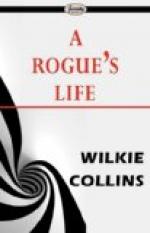We, of course, had nothing to do with the passing of false money—we only manufactured it (sometimes at the rate of four hundred pounds’ worth in a week); and left its circulation to be managed by our customers in London and the large towns. Whatever we paid for in Barkingham was paid for in the genuine Mint coinage. I used often to compare my own true guineas, half-crowns and shillings with our imitations under the doctor’s supervision, and was always amazed at the resemblance. Our scientific chief had discovered a process something like what is called electrotyping nowadays, as I imagine. He was very proud of this; but he was prouder still of the ring of his metal, and with reason: it must have been a nice ear indeed that could discover the false tones in the doctor’s coinage.
If I had been the most scrupulous man in the world, I must still have received my wages, for the very necessary purpose of not appearing to distinguish myself invidiously from my fellow-workmen. Upon the whole, I got on well with them. Old File and I struck up quite a friendship. Young File and Mill worked harmoniously with me, but Screw and I (as I had foreboded) quarreled.
This last man was not on good terms with his fellows, and had less of the doctor’s confidence than any of the rest of us. Naturally not of a sweet temper, his isolated position in the house had soured him, and he rashly attempted to vent his ill-humor on me, as a newcomer. For some days I bore with him patiently; but at last he got the better of my powers of endurance; and I gave him a lesson in manners, one day, on the educational system of Gentleman Jones. He did not return the blow, or complain to the doctor; he only looked at me wickedly, and said: “I’ll be even with you for that, some of these days.” I soon forgot the words and the look.
With Old File, as I have said, I became quite friendly. Excepting the secrets of our prison-house, he was ready enough to talk on subjects about which I was curious.
He had known his present master as a young man, and was perfectly familiar with all the events of his career. From various conversations, at odds and ends of spare time, I discovered that Doctor Dulcifer had begun life as a footman in a gentleman’s family; that his young mistress had eloped with him, taking away with her every article of value that was her own personal property, in the shape of jewelry and dresses; that they had lived upon the sale of these things for some time; and that the husband, when the wife’s means were exhausted, had turned strolling-player for a year or two. Abandoning that pursuit, he had next become a quack-doctor, first in a resident, then in a vagabond capacity—taking a medical degree of his own conferring, and holding to it as a good traveling title for the rest of his life. From the selling of quack medicines he had proceeded to the adulterating of foreign wines, varied by lucrative evening occupation in the Paris gambling houses. On returning to his native land, he still continued to turn his chemical knowledge to account, by giving his services to that particular branch of our commercial industry which is commonly described as the adulteration of commodities; and from this he had gradually risen to the more refined pursuit of adulterating gold and silver—or, to use the common phrase again, making bad money.




